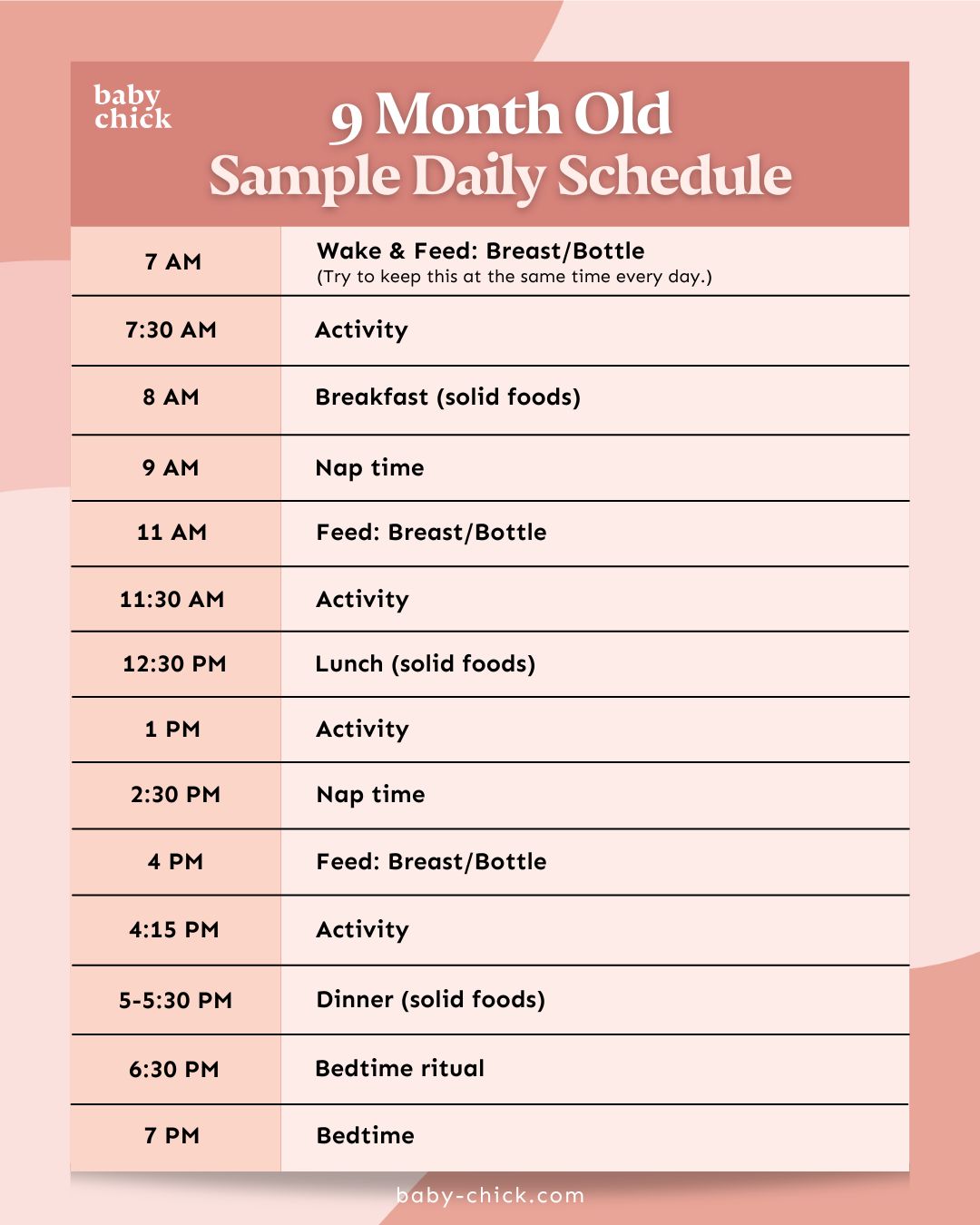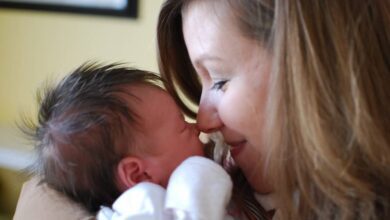9-Month-Old Baby: Feeding, Sleep, and Milestones by Month

Get ready — the next month of development is going to be powerful! At 9 months old, your baby will experience more vocal growth in his developmental stages, and he will love interacting with the people around them. This article will cover all of their new developmental milestones, including their feeding schedule, a sample sleep schedule, and fun ways for you to bond with your 9-month-old baby. We’ll also explore how much a 9-month-old should weigh, whether they can experience sleep regression, and when their wake window is. So, let’s dive in!
If there’s one word to describe your baby’s upcoming development, it’s “noise!” During this time, they will begin to find their voice and communicate it to you. Your 9-month-old’s new and exciting milestones include:1
- Being shy, clingy, and afraid of new people
- Shows different emotions like joy, anger, and sadness
- Responding to their name
- Making a variety of nonspecific sounds (ie, babbling), including consonants
- Bringing two things together
- Raising their arms and making noise to carry
- Getting into a sitting position without assistance and sitting without support
- Throwing objects towards themselves with their fingers/hands
At 9 months old, your baby’s appetite continues to grow. Your 9-month-old’s feeding schedule will follow their caregivers’ breakfast, lunch, and dinner schedule. Their portion size will also increase.2 Breast milk and formula will continue to provide most of their nutrients; however, consuming a variety of fruits, vegetables, pasteurized dairy, and proteins will provide them with additional nutrients.2
Offer foods that are easy to eat, such as juices, mashed foods with little lumps, and soft vegetables. This will help baby gain confidence in different textures.2 Giving them iron-fortified baby cereal is also a good option, but only add the cereal to your baby’s bottle if your doctor tells you to do so.3
To monitor your baby for any food allergies, introduce only one new food at a time and wait a few days before introducing another. This gives you time to notice if the baby has any food allergy symptoms. Signs that they may be having a food reaction include:3
- Rash
- Diarrhea/vomiting
- Breathing problems
- Rashes
If your baby is experiencing trouble breathing, seek immediate medical attention.
Contrary to popular belief, introducing high-allergen foods early in your baby’s life will not increase the likelihood that they will develop food allergies. Introducing highly allergenic foods such as wheat, soy, peanuts, eggs, milk, and peanuts is safe as long as you monitor your baby for any allergic reactions.3
While many babies can consume a wide range of foods, certain foods should be avoided, including:3
- Foods with added sugar or no-calorie sweeteners
- Foods with high sodium
- Honey and any food that contains honey
- Unpasteurized juice or dairy products
- Choking hazards such as hot dogs, raw carrots, grapes, popcorn and peanuts


Your 9-month-old’s sleep pattern will continue to follow the sleep pattern they’ve had before. They still need 12-16 hours of sleep every day and usually sleep for two days, averaging three to four hours in total.4 However, your 9-month-old may experience another period of sleep regression. Sleep regression is a change in your baby’s sleep pattern, including difficulty returning to sleep or staying asleep. The baby may start to sleep for shorter periods of time, become more fussy, or have a change in appetite. Sleep regression takes two to six weeks on average.5
Here are the common causes of sleep regression:5
- Pain from teething
- Reaching a new milestone in development
- A growth spurt
- A change in their routine
- Travel
- pain
Restoring sleep is difficult for both parents and babies, but there are ways to get through it with your 9-month-old. This includes:5
- Keeping a consistent bedtime and nap time
- Recognizing your baby’s sleep cues and putting them down at the first sign of fatigue
- Allow the baby a few minutes of restlessness before responding when they wake up in the night


During this period of sleep regression, it is important to maintain a predictable daily schedule. Your 9-month-old will still take two naps every day, split between morning and afternoon, and have wake windows of about two to three hours each.6 Every baby’s bedtime and nap times look different depending on their individual needs, but a sample sleep schedule for a 9-month-old can help you develop your own. Here is an example:6
- 7-7:30 in the morning — Wake up for the day.
- 9-9:30 am — Have the first nap of the day, which should last one to two hours.
- 2-2:30 p.m — Have a second nap of the day. It should also take one to two hours.
- 7-8 p.m — Do their bedtime routine and sleep.
Allowing the baby to go to sleep after 4 pm can make it difficult for them to fall asleep at night. So, aim for a bedtime 10-12 hours before your baby usually wakes up for the day. This will help the baby get enough sleep.6
A regular check-up is recommended at the age of 9 months, as this is an important visit for checking weight and milestones and answering parents’ questions. There usually aren’t any routine vaccines for your 9-month-old other than their annual flu shot. This vaccine is recommended for any baby over 6 months of age during the cold and flu season. It should be given before the end of October to protect your baby from the flu.7
Many parents wonder how much their 9-month-old should weigh. On average, a 9-month-old boy weighs between 17 and 25 pounds, while a 9-month-old girl weighs between 15 and 23 pounds.8 Remember, every baby grows at their own pace, but if you’re concerned about their growth, don’t hesitate to contact their pediatrician.
Monitoring your child for common childhood illnesses that they may get is important. These diseases include:9
It is important to seek medical attention for the baby if they begin to experience any of the following symptoms:9
- Fever lasting more than three days
- Ear pain
- Difficulty in breathing
- Change in attitude, such as increased irritability or dizziness
- Dehydration (cracked lips, decreased wet diapers, and decreased tears)


During this time, the baby will continue to develop their personality; the best way for them to do that is by contacting their parents. They will begin to copy and imitate you, giving you many opportunities to teach them sounds and language. Some ways you can do this are:10,11
- Sing fun songs and include actions or sounds for baby to mirror
- Provide toys in different shapes, sizes, colors, and textures and toys that make noises as they interact
- Play peek-a-boo
- Place a toy out of baby’s reach and encourage them to pick it up
- Read to your baby every day
Safety is always important for parents, but never more so than when their baby becomes mobile. Giving baby a safe place to play and explore is important. You can reach it by:12,13
- Removing small objects that are easy to swallow out of their reach
- Placing gates on staircases or on the doors of rooms you don’t want them to enter
- Installing window guards on all windows, not just above the first floor
- Their crib was moved away from any window
- Keep hot foods and drinks out of reach
- They are not left unattended in the bathtub
Now that your baby has found his voice and his personality is blossoming, the fun will never stop! They will continue to grow and develop, and you will continue to be amazed by their new skills.





